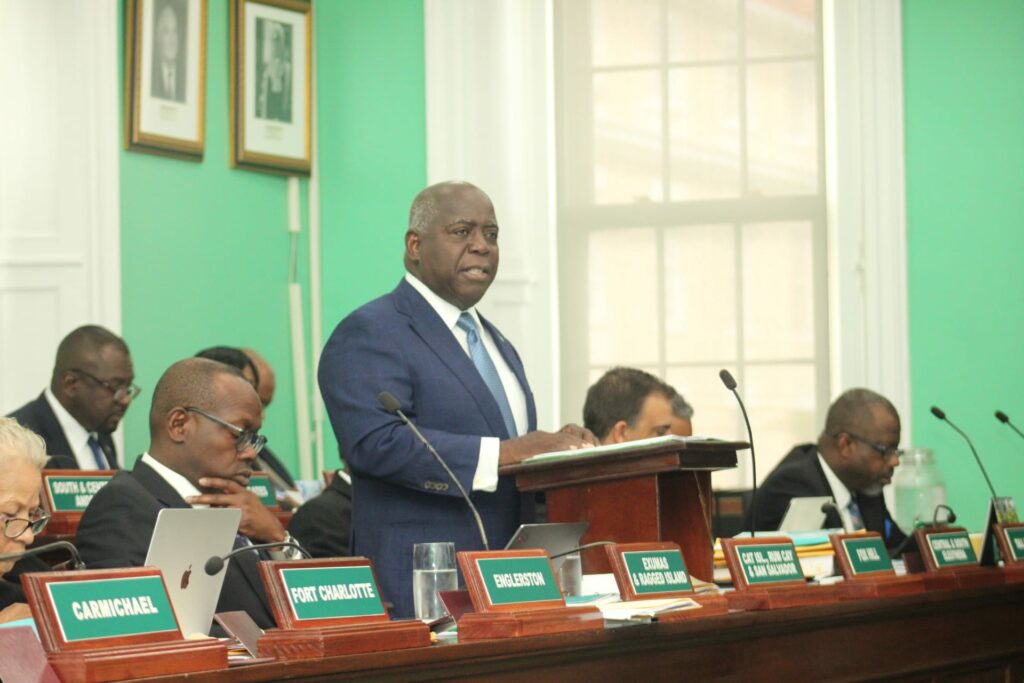
NASSAU, The Bahamas – During his Contribution to the Debate on the Electricity Bill, 2024 and the Natural Gas Bill, 2024, Prime Minister and Minister of Finance the Hon. Philip Davis stated that the two Bills provided the legislative framework that will support “our nation’s energy reforms – reforms that will light the way forward to a brighter future”.
“Our objectives are clear,” Prime Minister Davis said in the House of Assembly, on May 1, 2024. “We want to lower light bills for Bahamian families and businesses. We want to ensure that the electricity supply is more reliable, so that power outages are a thing of the past. And we want to drive our country’s transition to cleaner energy.
“The bills before us today are essential to supporting progress on all of these fronts.”
Prime Minister Davis noted that his Government will soon deliver the country’s first comprehensive energy reforms, and that those reforms will deliver savings for the Bahamian people.
“For too long, the cost of electricity has afflicted Bahamian families and businesses,” he said. “For many, their light bill at the end of the month comes close to – or even tops – their rent or mortgage payment. It’s a major expense, and a major burden. Small businesses which might otherwise have succeeded have closed their doors because of the impact that the cost of electricity had on their bottom line.”
Prime Minister Davis added: “In addition, the global inflation crisis hit small island nations like ours especially hard. Despite the fact that my government has raised the minimum wage, lowered VAT, and lowered customs duties, the rising tide of inflation has dampened the impact of these empowerment policies and robbed our people of the gains they are due. However, we aren’t close to finished – we are building affordable housing, and investing significantly in our agricultural sector, and there are more important reforms and policies to come.”
Prime Davis pointed out that his Government had always known that to see enduring relief from the high cost of living in The Bahamas, it would need to bring down the cost of electricity.
“I emphasized earlier that the reforms we are planning will be comprehensive — because we share with the Bahamian people a conviction that our electricity sector requires transformation, and that we need to put the days of tinkering at the margins – the days of Band-Aids and temporary fixes – behind us,” he stated,
“We need system-wide change, because in order to reduce the cost of electricity for consumers, we need a grid that is well-designed, effective and efficient,” Prime Minister Davis added.
He stated that the power grid was at the end of its life.
“We simply cannot lower costs – or meet our full potential as a nation – with outdated, deteriorating energy infrastructure,” Prime Minister Davis said,
He noted that an “aging 20th century grid can’t support a dynamic 21st century economy.”
Prime Minister Davis pointed out: “Not in a digital era, when so many of us rely on computers and smartphones for working and studying, and not in a climate change era, when warmer temperatures mean the air conditioning gets turned on more often.
“Not when smart and serious investors require reliable, sustainable power.”
He added that his Government was working to make government buildings more energy-efficient, and to encourage responsible electricity consumption and the use of energy-efficient appliances in the public and private sector.
“But the reality is, the demands on our power generation and delivery systems are only going to go up, not down,” Prime Minister Davis said. “And not only is our grid deteriorating – making it prone to outages, and vulnerable during strong storms – it also lacks the capacity to integrate large-scale renewable energy.”
“Not long ago, one of our Caribbean neighbours had to stop a large-scale, multi-million dollar solar expansion upon realizing that its outdated power grid could not absorb solar generation,” he continued. “This is no mere hiccup; setbacks of this nature cost the people time and money. We will not make the same mistake.”
Prime Minister Davis pointed out that solar energy had always been essential to his Government’s plans – but solar power was intermittent. That meant, he said, the amount of solar power generated “will fluctuate – will vary – depending on whether it’s a sunny day or a cloudy day, daytime or nighttime.”
“Using solar energy across our archipelago requires careful planning and design, and major new investments in grid flexibility and energy storage,” he added.
Prime Minister Davis noted that the BPL his Government inherited from its predecessors was in “serious crisis”.
He said: “$500 million in debt. Half a billion dollars. With experts telling us we need another $500 million in capital investments, to rescue and then modernize a grid on the verge of collapse.
“That’s more than one billion dollars, just to get BPL on track. And that’s before we get to the additional $100 million-plus in pension liabilities. And let me say this clearly: we will meet every commitment to our workers. No one will lose their job, and pension and other commitments will be met.”
“So, while we are clear about how crucial it is to lower bills for Bahamians struggling with the too-high cost of living, clear about the necessity and urgency of upgrading our grid, and clear about our commitment to Bahamian workers, we aren’t going to say that it’s been simple or effortless, finding the right way forward – especially during a time when many other countries are making their own transitions to solar and LNG, and the availability of critical materials can lead to long wait times,” Prime Minister Davis added.
“But we have big ambitions for The Bahamas and for the Bahamian people. And we don’t believe in standing still. We came here to tackle the most difficult and most consequential problems – the ones that hold our country and our people back.”
Prime Minister Davis stated that, to create a 21st century economy, The Bahamas needed “a 21st century power grid – a modern grid that is more efficient and cost-effective, capable of transmitting clean energy, and more resilient and capable of withstanding hurricanes.”
“In other words: a new energy future for our country: extensive use of solar power, in New Providence and in the Family Islands, LNG as a partner fuel, and a modern power grid,” he stated.
He added: “We have already begun laying the foundation for this paradigm shift in our Family Islands. In December of last year, we put out a Request For Proposals for Solar and LNG generation in the islands and saw a strong response from both international and local providers.
“We are now in the final stages of selection, and I look forward to being able to announce the providers in the coming weeks.”
Prime Minister Davis noted that, as The Bahamas moved forward, it needed the right laws in place to support its progress.
“With the Electricity Bill (2024), we are repealing and replacing the Electricity Act and repealing the Electricity Rate Reduction Bond Act, which promised funding that never materialized,” he said.
“Our Bill ensures that URCA (Utilities Regulation & Competition Authority) will have regulatory oversight over renewable energy, and promotes the adoption of efficient energy practices,” Prime Minister Davis added. “URCA will also act as an arbitrator should any disputes arise between licensees and a third party.”
Prime Minister Davis stated that the Bill allowed system operators to enter into management agreements with licensees to manage specific functions, and allowed URCA to take restorative natural disaster relief costs into account when tariff rates were being determined.
“The Bill introduces a transition period of three years in which URCA will accept the existing tariff rates presently in effect for licensees,” he said. “During the next three years, a tariff review will be conducted with the objective of making the rates more equitable. It is our intention for tariff rates to residential consumers to go down, not up.”
He added: “This forward-looking Bill is also the first legislation in our nation’s history to regulate artificial intelligence and machine learning. In clause 18, the Bill requires any person or entity developing or deploying AI (artificial intelligence) and ML (machine learning) to demonstrate transparency and comply with all applicable laws, including those which cover data protection, cybersecurity, privacy and intellectual property.”
Prime Minister Davis pointed out that there was also the requirement that the use of AI be inclusive by design, considering the needs of the elderly, disabled, and other vulnerable groups.
“This is comprehensive legislation, characterised by the effort to modernise the legal framework so that we can deliver change for the Bahamian people, while ensuring that URCA has robust regulatory powers,” he said. “The legislation provides URCA with the legal authority to navigate a complex, evolving energy landscape, with the flexibility to take advantage of innovations and opportunities in the sector.”
Prime Minister Davis added: “This Bill also specifies that the Grand Bahama Power Company is an approving authority for the island of Grand Bahama – that simply means it is authorised to generate and sell electricity in that jurisdiction. Who does not want to benefit from more affordable, more reliable, cleaner energy? Yes, we believe Grand Bahama should be included.”
He pointed out that the Bill also recognised URCA as the regulatory authority for Grand Bahama.
“And this is nothing new,” he stated. “This Government has always maintained that the Electricity Act and URCA’s regulatory authority extends to the Grand Bahama Power Company, so this is nothing new. This view will now be reflected in the law.”
Prime Minister Davis noted that the Natural Gas Bill, regulated liquified natural gas (LNG) for power generation purposes. That Bill, he said, created a framework for LNG that ensured that all LNG-related operations were “carried out in a safe, efficient, effective, economically viable and environmentally sound manner.”
“I know the Bahamian people have heard about the potential of LNG for quite a number of years,” he said. “The Bill before us today finally paves the way for LNG to be effectively integrated into our fuel mix.”
Prime Minister Davis added: “Through this Bill, we have assurances to the Bahamian people that the transport and storage of LNG will be done in accordance with the highest health and safety standards. This Bill also promotes competition within the sector by prohibiting anti-competitive agreements and practices.”
He pointed out that, once again, his Government was ensuring that the people of Grand Bahama were not left out, as the legislation specified that the Bill applied to the entirety of The Bahamas “inclusive of the Port Area in the island of Grand Bahama. For the avoidance of doubt, this Act applies to any gas sector supplier in the Port Area.”
Prime Minister Davis noted: “Of course, URCA also retains its country-wide regulatory authority for matters pertaining to LNG as well. In fact, URCA will be empowered to expedite approval for licenses as long as the company has been operating internationally for more than five years in an URCA-approved jurisdiction. Such companies must apply for a license within 12 months of the commencement of the Act.
“The goal here is efficiency and flexibility so that LNG can be brought into our fuel mix as soon as possible.”
Prime Minister Davis pointed out that, as he said earlier, his Government’s commitment to BPL workers was “ironclad”.
He said, “We will continue to honour existing union agreements. We will accomplish our objectives without layoffs. We are a government that takes our commitment to workers seriously.”
Prime Minister Davis noted that his Government signed more than 25 new labour agreements in two and a half years.
“We continue to have regular meetings with unions and take a proactive approach to dispute resolution, to ensure that Bahamian workers are respected and protected,” he added. “We have always prioritised our partnerships and relationships with local unions, and BPL’s union is no exception.”
Prime Minister Davis stated that real energy reform required “embracing innovation, new opportunities, and more effective business models to get BPL back to a healthier financial standing, and to finally lower costs for consumers”.
“We are ushering in a new era of power generation,” he said. “And I can say with confidence to the Bahamian people that we will deliver on those three strategic objectives of more affordable, more reliable, and cleaner electricity.
“This is a monumental undertaking – the most ambitious energy reform agenda ever initiated in our history,” Prime Minister Davis added.
“The Electricity Bill, 2024 and the Natural Gas Bill, 2024 have my unreserved support, as important stepping stones on the path to our country’s brighter energy future.”







